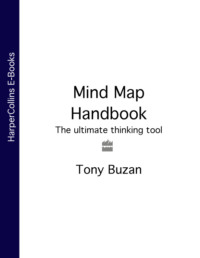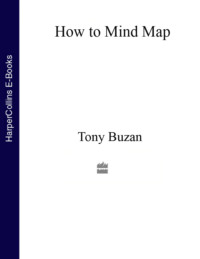
Полная версия
The Power of Verbal Intelligence: 10 ways to tap into your verbal genius
Persist in Your Pursuit of Verbal Power
Remember that one of the prime qualities used to describe the incredible intelligence and accomplishments both of babies and the great geniuses is that single word: persistence. The Oxford English Dictionary defines ‘persistence’ as meaning: ‘To continue firmly in an opinion or course of action in spite of difficulty or opposition; to continue to persist.’ It comes from the Latin ‘per’ and ‘sistere’ – ‘to stand firm’.
If you steadfastly pursue your goal of Verbal Intelligence, you will become much more Verbally Intelligent, and will approach the incredible skills of the baby and the genius in this area. Persist and you will overcome all obstacles to learning. Persist and your mistakes will turn into successes. Persist and you will acquire thousands of new word-friends.
Persist!
Word Power Booster Number 2
In this vocabulary booster section I introduce you to some fascinating adjectives. They will spice up your conversation, adding richness and depth to it. Choose the definition that you think is closest to the correct meaning from the four options given for each. See the answers here.
1 DIDACTIC (dy-dák-tik) (a) Teacher-like; instructive (b) Aggressive (c) Explosive (d) Like an extinct bird
2 SURREPTITIOUS (surep-tísh-us) (a) Grey in colour (b) Serrated (c) Stealthy or secret (d) Completely silent
3 HERETICAL (heh-rét-ikal) (a) Deserving of punishment (b) At the present time (c) Greek behaviour (d) Revolutionary; contrary to the official/established viewpoint
4 COPIOUS (kópe-eus) (a) Able (b) Abundant; plentiful (c) Religious (d) Relating to the police
5 IMPERATIVE (im-pé-rra-tif) (a) Royal (b) Relating to the empire (c) Vital (d) Strong
6 INEFFACEABLE (in-e-fáce-abul) (a) To confront (b) Incapable of being erased; indelible (c) Female face (d) Building
7 INESTIMABLE (in-ést-im-abul) (a) Not enough time (b) Priceless; immeasurable (c) Unfriendly (d) Timetable
8 UNPRECEDENTED (un-préss-e-den-ted) (a) Never known or done before (b) Description of dental procedures (c) Damaged (d) Before production
9 UNEQUIVOCAL (un-e-kwívo-cal) (a) Different voices (b) Unambiguous; leaving no doubt (c) Unequal (d) Discordant choir
10 CATEGORICAL (kata-górr-ical) (a) Bluntly and unconditionally expressed (b) Dividing into categories (c) About cats (d) Vaguely defined
Word Power I – Roots: How to Improve Your Vocabulary, Creativity, Memory and IQ!

Chapter Three
‘Words are the instruments that make thought possible.’
Judd
‘Words are the body of thought.’
Carlyle
In this chapter and the next you are going to learn more about the incredible power of words.
I will guide you through recent history, showing you how words developed as a ‘secret power’, and will introduce you to research that show why this was so.
The bulk of this chapter and the next are then devoted to a veritable feast of building blocks of vocabulary and Verbal Intelligence: Roots, Prefixes and Suffixes.
With the mastery of these your Verbal Intelligence will inevitably improve, and your life will change irrevocably!
Case Study – A Word About Business
In America, Dr Johnson O’Connor, who worked at the Human Engineering Laboratory in Boston, was fascinated by the relationship of vocabulary and professional success. He gave a vocabulary test to 100 young men who were studying to be industrial executives. Five years after the original experiment, Dr O’Connor checked how successful the young businessmen had been in their careers.
The correlation was astonishing. Of those who had scores in the top 25 per cent of the original vocabulary test, all were in executive positions.
Of those who had scores in the lowest 25 per cent of the original test, not a single one had become an executive!
words and power
Since the dawn of civilization, words have had an aura of mystery, magic and power to them. The earliest form of writing (Cuneiform) developed in the Near East, in Mesopotamia, to allow rulers to keep accurate records of what taxes were due and who had paid them, and for other bureaucratic records, such as details of amounts of grain stored and distributed.
In ancient Egypt the priests were the ‘keepers of the word’. They tried to keep the art of writing and reading secret, because doing so gave them tremendous power to manipulate both knowledge and people. For the next four thousand years leaders in all societies kept this special power to themselves, communicating in the secret codes of higher vocabulary and writing, while the ignorant masses around reacted with awe, superstition and fear at the power that words held over them.
‘We rule men with words.’
(Napoleon)
This power was the power over knowledge; the power of persuasion; the power to inspire; the power to mesmerize; and the power to control and lead. In other words, it was the power to affect the human brain.
Two of our modern words, which you would never have thought would have derived from this history, do – ‘spell’ and ‘glamour’!
As recently as the great European Renaissance, the time of Queen Elizabeth I and the master-works of Shakespeare, still surprisingly few people could read or write. The record books show that most of the young people who had to sign for a marriage licence did so not with their name, but with a cross.
The ability to read and write was looked upon by the ordinary people with awe, and those who were able to do so were often considered to be dabbling in some form of magic. Those who could write could, in general, spell.
So the logic in the ignorant and fearful mind was that those who could spell possessed a magic that could mysteriously and ominously control others. As a word could be considered a ‘spell’ the owner of such esoteric knowledge, by using words, was ‘casting spells’: QED!
The word ‘glamour’ has a similarly interesting etymology, or derivation.
In the 17th century the language of the intellectuals was predominantly Latin. In this they used to write, converse and increase their grip on social, economic and political power.
To ‘tie their words together’ they used the mystical concept of ‘grammar’. Grammar became an idea that linked with those who had authority and power. As time passed the first ‘R’ in grammar slowly mutated, as ‘R’s often do over time, to the letter ‘L’. Thus ‘grammar’ eventually became ‘glamour’, a word that is still applied to those who emanate an aura of power, elegance and control.
Конец ознакомительного фрагмента.
Текст предоставлен ООО «ЛитРес».
Прочитайте эту книгу целиком, купив полную легальную версию на ЛитРес.
Безопасно оплатить книгу можно банковской картой Visa, MasterCard, Maestro, со счета мобильного телефона, с платежного терминала, в салоне МТС или Связной, через PayPal, WebMoney, Яндекс.Деньги, QIWI Кошелек, бонусными картами или другим удобным Вам способом.







